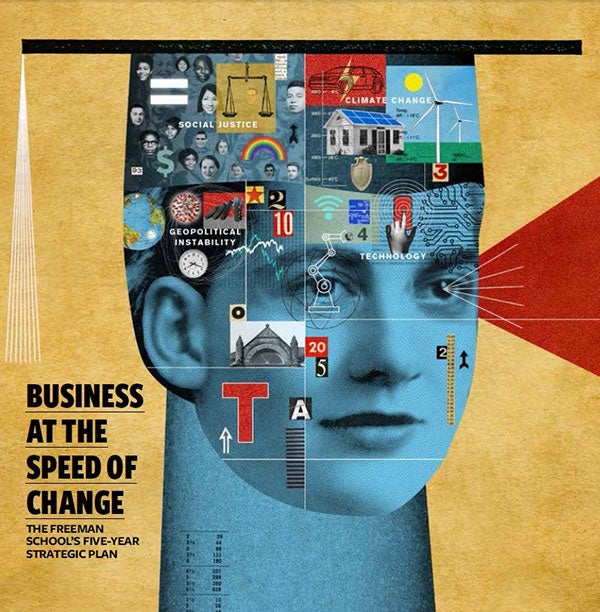
The A. B. Freeman School of Business completed its last strategic plan in the fall of 2013. That plan yielded a host of significant achievements, including the construction of the Goldring/Woldenberg Business Complex, the establishment of the Lepage Center for Entrepreneurship and Innovation, and the launch of new degree programs including the Master of Business Analytics.
In the last 10 years, however, the global business environment has changed dramatically. Technology, in the form of data science, robotics and artificial intelligence, has led to an explosion of smart automation, eliminating millions of jobs but also creating new ones with new skill sets. Climate change is propelling innovation across industries but especially in energy, where the transition to renewables is rapidly reshaping the business landscape. Geopolitical instability, in the form of international conflicts and trade wars, is another driver of change as organizations grapple with its economic and societal impacts.
Perhaps the most striking aspect of these changes is the speed with which they are happening. The COVID-19 pandemic only accelerated the rate of change, hastening the process of digitization and prompting both employers and employees to reconsider traditional notions of the workplace and even work itself.
It was against this backdrop of rapid economic and societal change that the A. B. Freeman School of Business initiated a new strategic planning process, one that sought to answer a primary question: Given these driving forces rapidly reshaping the world, what must business education do to ensure that leaders have the knowledge, skills and experience to face the growing challenges?
What we found, through extensive research, discussion and debate, is that the Freeman School is uniquely well positioned to lead in this new business environment.
TECHNOLOGY
Smart automation and other technological advances impacting the future of jobs call for educational programs that enhance uniquely human capabilities — critical thinking, working in groups, design thinking, the ability to connect the dots, empathy. The Freeman School’s long-established excellence in experiential learning and Tulane University’s strong foundation in liberal arts provide these skills. The ability to read, analyze and communicate with data is another increasingly important skill in the emerging environment, as recognized by the Data Hub, Tulane University’s new center for data literacy. Programs such as our Master of Business Analytics provide students with the advanced skills necessary to leverage data and lead the digital transformation.
CLIMATE CHANGE
Managing the transition to renewable energy requires in-depth knowledge of both fossil fuel economics and the emerging business of renewables. The Tulane Energy Institute and the Master of Management in Energy program focus on each of these critical areas, providing managers with the perspective and understanding to lead us to a more sustainable future.
GEOPOLITICAL INSTABILITY
International conflicts call for greater global awareness. Through the Goldring Institute of International Business and Freeman Study Abroad & Exchange, students gain international experience and cultural understanding by participating in programs with dozens of partner institutions around the world. For students on campus, New Orleans — a major port and gateway to Latin America — offers outstanding opportunities for international learning and experience.
SPEED OF CHANGE
The proliferation of data, the convergence of technologies and the rapid rate of change call for shortened learning cycles and partnerships with industry. Freeman’s unique expertise in experiential learning and close ties to the New Orleans business community enable students to gain timely and relevant business knowledge and the ability to adapt and learn by doing, critical skills in a fast-changing environment. Rapid change also requires constant innovation. Through the Lepage Center for Entrepreneurship and Innovation and in partnership with the Tulane Innovation Institute, students learn to manage innovation by working with companies and technologies developed both within the university and throughout the region.
The Freeman School’s Strategic Plan represents the collective work of faculty, staff, students, alumni and other stakeholders and provides a roadmap for our activities and initiatives over the next five years. We feel strongly that we have leveraged the great strengths of the school to address the grand challenges of our times, and that this plan provides direction and goals for the school to meet these challenges. Where practical, our objectives include a quantitative goal aimed at measuring progress, and each of these goals requires collaboration and the work of individuals and teams from across the school to achieve. For these reasons, this plan has been conceptualized as a living document, which will be updated and adjusted as demanded by today’s dynamic environment. We look forward to sharing more details with you as we unveil new initiatives and achieve the goals set out within.
![]()
PAULO B. GOES, Dean, A. B. Freeman School of Business
OVERVIEW
The 36 action items in the strategic plan are designed to position Freeman as a business school of the future, providing the next generation of business leaders with the knowledge, skills and experience to manage the challenges of our time in the face of rapid change. Over the next five years, we will strive to achieve the following:
• Solidify our reputation as a highly prominent business school, ranked in the top 25 nationally among undergraduate programs and widely recognized for our impactful, industry-oriented graduate programs.
• Be a nationally recognized leader in experiential learning across programs, supported by a cutting-edge center featuring labs in technology and data analytics.
• Provide a transformative student experience with lifelong impact, from outstanding instruction focused on the future of business to individualized services for academic and career goals to an engaged network of alumni that supports continued advancement and success.
• Offer a flexible educational environment that adapts to the various ways today’s learners study and advance.
• Serve as an innovation engine, working closely with other units at Tulane to address critical issues of the time: environmental, social and governance; digital transformation, technology and data literacy; energy transition, sustainability and climate change.
• Foster a culture of research excellence, demonstrated by dissemination of high-impact business knowledge and advancement of junior and aspiring research faculty.
• Be a partner in service of our region and community, supporting businesses to grow, prosper and contribute to a sustainable future for New Orleans and the Gulf South.
SELECTED PLAN HIGHLIGHTS
ACADEMICS
Freeman’s academic environment is differentiated by the following central features:
• Academic excellence directed by a world-class faculty of scholars and practitioners.
• A high-touch, student-centric experience within a close-knit community.
• An emphasis on cutting-edge experiential learning throughout programs.
• A community that promotes an exchange of ideas across lines of difference.
• Powerful connections to the creativity, culture and joy of New Orleans, using the city as a portal to the world.
Over the next five years, our academic goals include the following:
UNDERGRADUATE PROGRAMS
• Modernize and expand the BSM curriculum in emerging and high-interest business areas including technology, data analytics, ESG issues and marketing.
• Develop new undergraduate certificates in strategic fields such as energy and sustainability, sports management, hospitality and real estate.
• Dramatically expand experiential learning throughout the BSM program.
• Advance and integrate student services to create a superior “Freeman Experience” for BSM students, encompassing advising, career management, study abroad, extracurriculars, and engagement with Freeman’s network of alumni and stakeholders.
• Develop and offer new Freeman School minors for non-business majors at Tulane.
GRADUATE PROGRAMS
• Overhaul the full-time MBA to focus on strategic skills that lead to excellent placement.
• Restructure the Professional MBA (PMBA) to become a hybrid in-person/online program focusing on experiential learning opportunities with local and regional businesses.
• Modernize the Executive MBA (EMBA) curriculum to incorporate more emerging and high-interest business areas.
• Launch an online MBA program and build a portfolio of online courses for use in the PMBA, international programs and other graduate programs as suitable.
• Grow the size of the Master of Management in Energy (MME) program and increase offerings in sustainable and renewable energy resources.
• Develop strategic connections between undergraduate and graduate programs, such as innovative 3+2 or 4+1 programs that attract students who want to further their undergraduate study by pursuing a master’s degree in the field.
INNOVATION
The Freeman School is home to a prestigious group of interdisciplinary centers and institutes, including the Albert Lepage Center for Entrepreneurship and Innovation, the Goldring Institute of International Business and the Tulane Energy Institute. These centers of excellence will be key in advancing Freeman’s innovation goals over the next five years. We will also open a new Center for Experiential Learning that will serve as the hub of all experiential learning at Freeman and house cutting-edge, hands-on labs focused on technology and analytics.
Over the next five years, our innovation goals include the following:
• Expand programs and strengthen partnerships at the Lepage Center for Entrepreneurship and Innovation to lead entrepreneurship education for Tulane students and support the New Orleans business community. Specific goals include developing a minor in entrepreneurship, expanding
participation in the Student Venture Incubator, increasing funding for entrepreneurship prizes and grants, expanding the network of mentors, and developing new partnerships with HBCUs and entrepreneur support organizations to offer in-reach educational programs.
• Enhance the Goldring Institute of International Business by developing programs with new university partners, updating curricula, exploring flexible modalities and improving the integration of Goldring programs with other Freeman programs.
• Expand expertise within the Tulane Energy Institute in the area of renewable and sustainable energy systems to educate future-focused leaders and support economic growth in the region related to the transition to lower greenhouse gas emission systems.
• Launch a comprehensive new Center for Experiential Learning with labs focused on technology and analytics.
KNOWLEDGE ADVANCEMENT
Tenured and tenure-track faculty are the backbone of any leading research university. To increase our research impact within the business areas of accounting, data analytics, finance, management and marketing, we seek to grow our overall number of tenured and tenure-track faculty. We will also cultivate a strong research culture, market our research successes, gain access to valuable datasets and experimental research environments, and enhance and expand our PhD
program to train the scholars and leaders of the future.
Over the next five years, our knowledge advancement goals include the following:
• Grow our tenured/tenure-track faculty in strategic areas.
• Cultivate a culture supportive of research excellence via mentorship and defined paths to collaboration
and co-authorship.
• Promote and showcase research excellence through a Freeman Research Lecture Series and research seminars and conferences.
• Strengthen our existing PhD program in finance and accounting and begin a PhD program in management.
• Place a renewed focus on telling the story of research at Freeman, both internally and externally.
CONNECTIONS
Successful business education requires extensive, robust connections to regional, national and international businesses, particularly in the school’s areas of strength and strategic growth. To increase our ability to attract top students, provide experiential learning and internship opportunities, and ultimately place students in rewarding careers, we will focus significant new resources on growing our connections with Freeman alumni, furthering existing and developing new
partnerships with corporations and large consulting firms, and expanding our relationships with and service to the local and regional business community. We will also expand and diversify opportunities for donors to engage with Freeman to support Tulane’s fundraising goals.
Over the next five years, our connections goals include the following:
• Hire an Executive Director of Corporate Relations charged with enhancing the Freeman School’s external presence and impact.
• Cultivate an alumni relations team charged with fostering close, mutually beneficial relationships with Freeman alumni.
• Add resources and direction to our Career Management Center (CMC) to expand and develop partnerships with corporations and alumni, engage with other Freeman student services, and explore relationships with area-specific and industry-specific career experts to support students’ career goals.
• Expand relationships and service within the Greater New Orleans and Gulf South business communities with a new PMBA focus on experiential learning and projects with local and regional businesses.
• Work closely with Tulane’s Office of Advancement to identify opportunities for constituents to engage with Freeman and help achieve ambitious fundraising goals.
ORGANIZATIONAL EXCELLENCE
Freeman has a world-class faculty and staff who are dedicated to our mission and values. The school’s administration is committed to creating a strong, healthy, supportive workplace that allows our faculty and staff to thrive. To advance this objective, we will make a variety of organizational changes to school processes, policies and procedures and appoint an Organizational Excellence Committee to make recommendations for continuous improvement.
Over the next five years, our organizational excellence goals include the following:
• Establish strong leadership for each Freeman degree program with ownership of and responsibility for the student journey from start to finish.
• Define paths to integrate the work of Freeman’s tenured and tenure-track faculty with Freeman centers and institutes to expand research partnerships, grow community engagement and enrich the student experience.
• Create a standing Organizational Excellence Committee to advise the dean on potential organizational improvements.
PATH TO SUCCESS
The Freeman School is a complex organization, and the goals in this plan are both comprehensive and ambitious in order to address the needs of our many stakeholders. To achieve success, faculty and staff across Freeman will need to commit their time, energy and expertise to further define and expand on the overarching tactics and timelines that have been outlined.
Moving forward, the faculty and staff leaders named in the plan will develop individual timelines to achieve each goal, expanding tactics where necessary and defining resources needed for success. As with the larger plan, these individual plans will be conceived as living documents and will be adjusted throughout the five-year period as is practical and as circumstances change.
A strategic plan steering committee will oversee the development of timelines and expansion of tactics for each goal. Timelines and a preliminary status report will be provided to Freeman faculty, staff and the Business School Council, and annual status reports will be provided throughout the implementation of the plan.
In the coming months, we look forward to sharing more information with you as we implement action items, launch new initiatives and achieve the ambitious goals we’ve set for ourselves. We hope you, our alumni and stakeholders, are as excited and inspired by this plan as we are.






